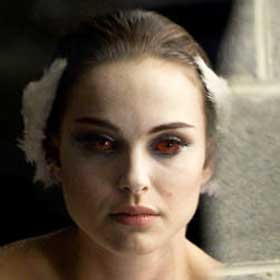Black Swan

4.5/5
Black Swan, the latest film from Darren Aronofsky (the director behind Pi, Requiem for a Dream, The Fountain and The Wrestler) is not merely about a production of "Swan Lake," but is told, at least in part, as a variation on the Tchaikovsky ballet. To make this possible, the film's writers, Mark Heyman, Andres Heinz and John McLaughlin, have not simply tailored their characters and events to the ballet’s plot, but have actually sought out believable characters—in other words: personalities, or, if you like, sufferers of personality disorders, typical to the world of ballet—and believable events—those materializing naturally from the interpersonal dynamics of said personalities—to reconstitute it. But in order to fully understand how they have achieved this effect, it is first necessary to undertake a very brief crash course on the history of ballet, specifically in terms of its relationship to prostitution: because the art of ballet is as much about dance and movement as it is the exhibition of finely honed bodies, it isn't at all surprising that, in the late 19th century, the backstage of the Paris Opéra Ballet was, quite notoriously, a brothel: attractive young girls plucked from working class backgrounds—not unlike Natalie Portman's character, Nina Sayers—were scrutinized, sculpted and polished by their instructors, trained in the art of alluring dance and trotted out onto the stage to act as a living advertisement for the more private seductions offered beyond the curtain.
Of course, the practice has fallen out of vogue, but its traces can be found in the modern day relationship of ballerina and choreographer, and are perhaps unavoidable given the atavistic link between dancing and sex. Because Nina's choreographer, Thomas Leroy (Vincent Cassel), must train his pupil in an art of seduction—one antiquated, though sexually charged nonetheless—it seems only logical that he would—much in the manner of the famed choreographer George Balanchine, upon whom Cassel claims to have based his performance—quite literally seduce her or, if you like, place her under his "spell," which, in its modern incarnation, becomes the power of a brilliant instructor over his impressionable young student. The spell turns Nina into a “swan”—a graceful, elegant, faultless creature; in Russian mythology: the embodiment of purity—who dwells above a lake of her (pathological stage-)mother Erica’s tears—those being the "tears" of a failed career as a dancer, the "lake" being their shared apartment: a demented shrine to her cosseted-to-point-of-being-tormented daughter. The parallels may, for the most part, end here—after all, the ballet's plot is a long and circuitous one—but, nevertheless, with Black Swan, Aronofsky and his collaborators have created a masterpiece of modern storytelling: so seamlessly are the ballet-within-the-film and the film-within-the-ballet interwoven that when, in the film's finale, the line separating the two finally disintegrates (for example, when the diegetic music of the ballet appears to be scoring not only the performance onstage but Nina's transformation backstage) it strikes the viewer as less bonkers and arbitrary than appropriate and organically achieved, yet still completely bonkers.
As I touched upon earlier, Black Swan’s self-harming Nina, her back-biting peers, her ecstasy-popping, bisexual doppelgänger Lily (Mila Kunis), her creepy stage-mother Erica (Barbara Hershey) and her predecessor in the role of the Swan Queen, the washed-up, suicidal prima ballerina Beth (Winona Ryder) may seem, to the uninitiated viewer, to be the stuff of melodrama. And while this may be true, they are also very much the stuff of the ballet world; in this sense, Black Swan is an observational horror film: a real-life horror story with real-life monsters. When Erica confuses the symptoms of Nina’s human-to-swan transformation with self-inflicted injuries, of which she is revealed to have a history, the viewer instinctually sides with Nina against the neurotic force of her mother. But, since this transformation may be completely imagined, the truth may be that Nina is deeply disturbed, which renders her mother’s fretfulness somehow justifiable. The viewer’s confusion regarding which—as well as the fact that Natalie Portman is obviously in her late 20s yet is playing a character who sleeps in a little girl’s bedroom surrounded by dozens of stuffed animals—heightens the film’s disorienting atmosphere.
Fans of ballet may actually find the film disappointing because most of the dance sequences are not shot for the sake of their artistry or in such a way that it might be appreciated, but as a means of showcasing in a by no means exaggerated fashion the grueling physical tolls exacted upon the body of a ballerina/o. Careful attention is paid to Nina’s sore limbs and cracked toenails: in fact, an entire sequence (highly reminiscent of Poltergeist) is dedicated to a killer hangnail. For this and similar reasons will Black Swan prove to be a very divisive film. Apart from being one of the scariest psychological horror films ever made, it is also, by far, the most cruelly depressing film by a director who, with the exception of The Wrestler, has only created depressing films. Its bleak tone is only intermittently leavened by the presence of Lily, who provides most of the film’s comic relief. And while stage-mothers like Erica do exist, there are moments when her characterization borders on contrived for the sake of making the film all the more bleak: for example, when in celebration of Nina’s being given the role of the Swan Queen, she buys her a cake, which she then abruptly threatens to throw away when Nina requests only a small serving. Viewers might also be curious to know why Nina’s mother has had so much plastic surgery.
Though Natalie Portman gives what is arguably the performance of her career, and Mila Kunis is nearly just as good, Black Swan features a few casting missteps: Vincent Cassel, though obviously a talented and capable actor, gives a well-intentioned but ultimately very one-note performance that borders on cliché—it is also difficult to accept that Beth might have once been his protégé when she is played by an actress (Winona Ryder) who is five years younger than he, who is, purportedly, playing a much older character—and Ryder is most disappointing. But whether the viewer finds him- or herself laughing at or applauding the balletic insanity of its dénouement, Black Swan will remain with him or her for a long time after the credits have rolled: it is a dark, disturbing minor masterpiece from one of the most important filmmakers of his generation.
RELATED ARTICLES
Get the most-revealing celebrity conversations with the uInterview podcast!







Leave a comment